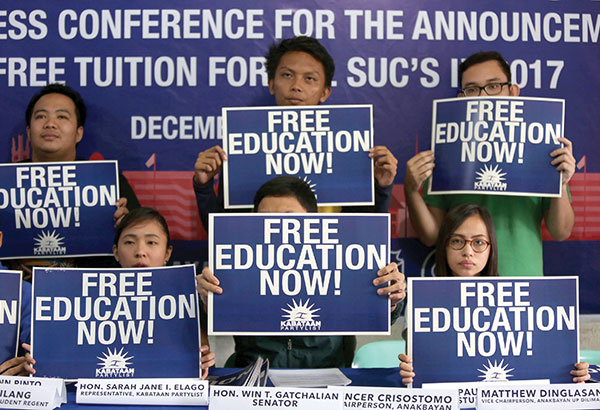‘Free tuition law a victory for present, future generations’
August 4, 2017 | 6:48am

The Kabataan party-list group welcomes the announcement of free tuition in all state colleges and universities during a press conference in Quezon City. The STAR/Boy Santos, File photo
MANILA, Philippines — Students will no longer have to pay tuition and other fees in government-funded tertiary institutions after President Rodrigo Duterte signed on Thursday night the highly-contentious Universal Access to Quality Tertiary Education Act.
The decision of the president to go against the recommendation of his economic managers to veto the bill was met with praises even from his critics, with militant students groups calling the development a victory for the present and future generation of Filipino students.
“If signed in full and without conditionalities whatsoever, the Universal Access to Quality Tertiary Education Act should provide free tuition and other schools fees for state universities and colleges, local universities and colleges, and technical-vocational institutions,” Anakbayan chair Vencer Crisostomo said.
“This should effect a ‘no collection policy’ in all tertiary state schools. The Commission on Higher Education and the state schools should waste no time and immediately implement this law,” he added.
Kabataan Party-List Rep. Sarah Elago, one of those who pushed for the passage of the free higher education law, lauded Duterte for signing the measure into law.
“The passage of the Free Tuition Law is an initial victory not only for the youth today but also for future generations. We have to keep vigilant, however, on possible limits that may be inserted in the new law’s implementing rules and regulations,” she said.
“Also, Congress has to address the fact that our economic managers excluded any type of funding for this significant legislation in the 2018 proposed national budget,” added Elago.
Presidential Commission for the Urban Poor chair Terry Ridon, a former Kabataan Party-List lawmaker, said signing the free tuition bill will be one the most important legacies of the Duterte administration as it ensures state support to the future of the nation.
“Millions of urban poor families aspiring for a better future of the children and families will benefit from the new law. In fact, this is a culmination of decades of struggle of the student and youth movement in the Philippines,” he said.
“The Duterte administration clearly sends a message to all our income poor households that low-income should not be a burden for our children to dream of a better life,” Ridon added.
Earlier, CHED commissioner J. Prospero de Vera refuted the claims of the administration’s economic managers that the policy would cost the government around P100 billion a year.
He said based on his computation, only around P34.1 billion would be needed to implement the provisions of the new law. He added that the implementation can also be staggered as not all provisions can be readily implemented by next year.
De Vera noted the need to come up with a well-designed program to implement the student loan provision of the bill, which he said could take at least one year as it would require coordination with financial institutions.
The commissioner also said that most of the local colleges and universities will still have to get recognition by CHED before they can implement the new policy.
“The core cost of the provision that can immediately be implemented – that is, the removal of tuition and other fees in state universities and colleges and some local universities and colleges – is just P16.8 billion,” said De Vera.
“I think this is a win-win solution,” he added, referring to his proposal to stagger the implementation of the free higher education policy.
Economic managers earlier urged Duterte to veto the bill due to the supposed huge funding that it would need from the government.
The call was supported by the Foundation for Economic Freedom, which noted that the policy will not benefit the poorest of the poor Filipinos.
It cited the study conducted by the Philippine Institute for Development Studies showing that only 12 percent of the poorest Filipinos reach college.
De Vera argued that the discussion on the impact of the bill should not be limited to the poorest of the poor Filipinos, stressing that there are families who have a hard time sending their children to college even if they do not belong to the lowest docile of the socio-economic strata.
“Our data is also based on empirical evidence. We know that this measure will help a lot of Filipinos,” he said.
BrandSpace Articles
<
>
Philstar
- Latest
- Trending
Trending
Latest






























